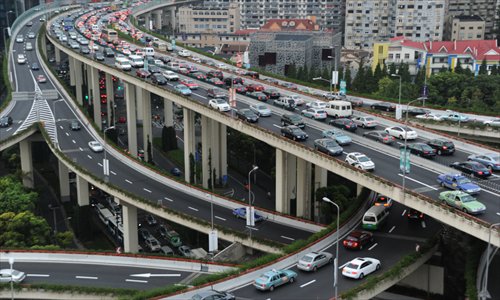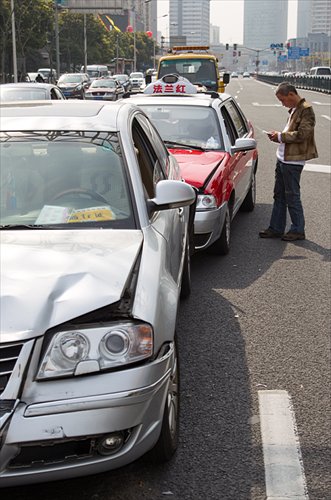'Agents' for car accident victims thrive on compensation payouts

Traffic in Shanghai. Photo: CFP
Chen Jieming didn't expect that he would be sued in court for a simple traffic collision which was seemingly resolved at that time.
In 2011, a motorized scooter bumped into his car near a residential compound in Shanghai. The girl driving the scooter hit his car's rear view mirror and bruised her lips.
Chen paid 5,000 yuan ($805) in compensation, but one year later, a man who claimed to be the woman's agent, sued him in court, asking for 110,000 yuan in compensation for the girl's injury.
The agent presented a permanent disability certificate from a local judicial appraisal center, showing that the girl had suffered a "grade 10" level disability. This was the least serious on the scale of 10 to 1, but it still meant she had suffered multiple bone fractures and a concussion, which were alleged to be much more serious than at the time of the accident.
Chen then realized he had run into a professional "accident agent."
Where there are loopholes, there are fraudsters seeking to take advantage of them. These agents persuade victims of traffic accidents that they can make them a profit in return for a one-time fee.
They then find ways to extract higher compensation fees from insurance companies and car owners by faking or exaggerating injuries. Sometimes they serve their "client" but sometimes they end up pocketing any extra money made.
Migrant workers are a common client, as they are not familiar with the city in which they live, and feel grateful when someone offers to help them out.
The existence of these agents has greatly increased the compensation payouts from insurance companies, and caused protracted legal proceedings against car owners. According to the Shanghai Bureau of the Insurance Regulatory Commission, Shanghai's compensation payouts reached 30.1 billion yuan in 2013, which increased 18.05 percent year-on-year. Among the payouts, property insurance accounted for the most, which reached 16.2 billion yuan and increased 17 percent over the previous year.
"Auto insurance is the fastest growing and takes the largest percentage in property insurance. These agents are the key reason for the rapid growth," an insurance insider surnamed Shen from the local insurance company, told the Global Times.
Usually, if insurance companies make insurance payouts on 65 to 70 percent of claims, this is regarded as the break-even point for the auto insurance industry.
But Shanghai's insurance companies have paid out in around 90 percent of cases for accidents involving motor vehicles in recent years, according to Li Weiqun, director of the Insurance Law Research Center of the East China University of Political Science and Law.
"These agents have become a black hole devouring large compensation payouts, and causing losses to insurance companies and car owners. In the end, these payouts will be split into every car owner's yearly insurance expense. This phenomenon needs our attention," Li told the Global Times.

A car accident in Shanghai. Photo: CFP
Games of deceit
Chen was astounded when he saw the disability certificate, because the injured woman had already recovered and returned to work as a real estate agent within a month of the accident.
"I think the agents may have bribed the doctors to fake the disability," he said. So in court, Chen asked the judge to find a third appraisal center to redo the examination. The new result shattered the previous findings and showed that the woman had no fractures or concussion at all.
But even though the new disability certificate overturned the previous one, the judge still preferred to believe the agents' disability certificate. "It was obvious that the judge knew the agent, so I complained to the prosecutor's office, and it took me a year to win the lawsuit in the end," Chen said.
There are several methods accident agents use to increase compensation payouts. Generally, they bribe forensic doctors in appraisal centers, so the doctor will issue a more serious disability certificate. "A more serious degree of disability means more compensation. In China, disability is divided into 10 grades, and if the agents increase it by one level, the insurance company has to pay 80,000 yuan more," said Shen.
In one case, a woman surnamed Lu was injured in a car accident and was classed as having a grade 9 disability. However, she later admitted that she never took any examination in an appraisal center. Agents got a fake certificate from an appraisal center without telling her. They paid her 40,000 yuan to be her agent, and charged 90,000 yuan to the insurance company on her behalf, the Xinmin Evening News reported.
Certifications showing mental problems or emotional anguish can even be faked more easily. In one case, a boy in primary school was defined as having a grade 9 disability and a slight intelligence deficit after a car accident. However, the insurance company later found the boy was enrolled in a key middle school and was a top student in the class.
Min Yinlong, a director of the Center for Forensic Science in the East China University of Political Science and Law, said forensic authentication is a subjective judgment based on professional knowledge. "That is the reason why appraisers are the ones in charge of the authentication result, not the appraisal center," Min told the Global Times.
In addition to faking disability certificates, turning hukou (house-registration certificate) from rural to urban is another way to raise compensation. Zou Guangqiang, a migrant worker from rural Anhui Province, had an accident in Shanghai in 2011. Two agents found him in a traffic police office, and promised that they could help him win the case.
The agents paid Zou 20,000 yuan and asked him to step out of the case. By faking his hukou, Zou become a Shanghainese working in a local company, and the agents charged the insurance company 97,000 yuan. "I didn't know they could get so much," Zou told the Xinmin Evening News.

Traffic accident agents gather in front of a police office in Minhang district, Shanghai. Photo: Yang Hui/GT
Gray zone
It is hard to crack down on accident agents since they operate in a grey zone and have formed a complete profit chain through bribes, according to Li.
Zhang Zhijun, an agent who runs a traffic accident consulting company in Shanghai, said his company receives at least 30 traffic accident cases each month. His office is located in an alley near a traffic police office in Minhang district, which makes it easier for him to find clients, and on his desk, X-ray images of injured people have piled up. "Most people are not familiar with the mediation process in traffic accidents and don't have enough time to deal with the lawsuit. But with our help, you don't need to show up and we will fully represent you," Zhang told the Global Times in an undercover interview.
He asked to split the compensation with the reporter, who pretended to have a slight bone fracture from an accident a few months earlier. "Your injury is too light, and I need to bribe a forensic doctor and the judge a lot," Zhang said. But he said that the compensation could reach 100,000 yuan. "I will pay the doctor to aggravate your injury, and I need to pay the court to make sure the judge doesn't allow a second disability assessment."
According to a retired appraisal center employee, injuries of different levels have different prices in their industry. "If doctors help to exaggerate the injury from a small one to a serious one, it costs around 10,000 yuan, and creating an injury from nothing costs 20,000 yuan. The price to raise the disability grade from grade 10 to 9 is 5,000 yuan," a former employee of an appraisal center, who refused to reveal his name, told the Global Times.
"We have connections with every link, and the doctors and judges trust us so that they are willing to take our bribes. They will not risk accepting a stranger's money, like the injured people," Zhang claimed.
According to Li Weiqun, police also play an important role at the beginning of the accidents. "Police will tip off agents when a traffic accident happens, so that agents can find them in the hospital as soon as possible. Police will receive more than 500 yuan for information of an accident," Li said.
Hitting back
According to China's Insurance Law, insurance fraud punishments only apply to the insured, including the insurance applicant and the beneficiary, so the authorities cannot punish these agents for fraud. There is a Civil Procedure Law, in which anyone forging or destroying important evidence or trying to obstruct a case by the people's court can be fined up to 100,000 yuan and be detained for up to 15 days.
"It's hard to prove agents are faking documents. The cost of breaking the law is so low that such illegal behavior thrives," said Li.
In contrast to foreign countries where insurance companies have their own investigators to obtain evidence, only the insurance supervision department is endowed with the right to investigate in China. Even if the insurance company gets suspicious, they are not allowed to conduct an official investigation.
"In fact, it's also hard for the supervision department to investigate if the traffic department and hospital refuse to cooperate," Li added.
According to Shen, many insurance companies have set up anti-agent groups and try to intervene in the cases before the injured parties can finish medical treatment. "If we get in early, there's 50 percent chance of avoiding insurance fraud," he said.
Li suggested courts should reduce restrictions on reappraisals, and said they could rule disability certificates invalid if the doctor refuses to appear in court.
The court should also require that only those injured can get the compensation, and that agents are not allowed to take the money on behalf of them, Li added.